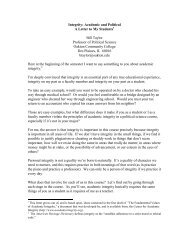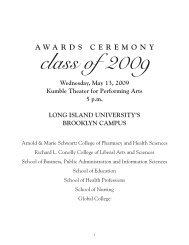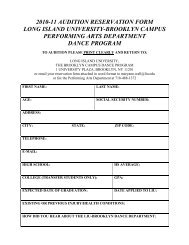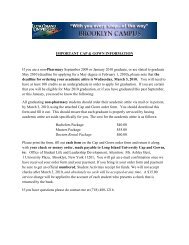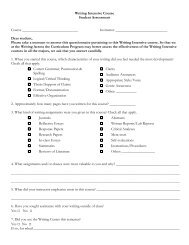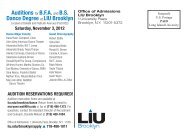united nations advanced certificate faculty - Long Island University
united nations advanced certificate faculty - Long Island University
united nations advanced certificate faculty - Long Island University
You also want an ePaper? Increase the reach of your titles
YUMPU automatically turns print PDFs into web optimized ePapers that Google loves.
a long-suffering people. In stark contrast to the words of Sergio Vieira de Mello and his staff, the<br />
Bush administration, through US civil administrator Paul Bremer and his staff on the ground,<br />
tends to tell the Iraqis what they should or should not do with an attitude of both teaching and<br />
preaching. A case in point is Paul Bremer’s bullet-point orders to the Iraqi Governing Council following<br />
the attack on the United Nations, whereby he urged the Council to give the public the<br />
impression that this puppet body was in charge of the country. “Tell them that the Governing<br />
Council needs to be seen governing, not later, but now,” the memo from his staff read. The patronizing<br />
tone of Bremer’s command to the powerless Council, whose hands are tied to US directives,<br />
did not go down well with some of its members. “We should have a real government, and then we<br />
could begin to solve Iraq’s problems,” one Council member responded in indignation.<br />
As for George W. Bush’s personal attitude to international problems, we are all too familiar with<br />
his crusade-like approach in the name of the “civilized world.” Tragically, the definition of “civilization”<br />
by the world’s most powerful political leader has proven to be a world order where international<br />
human rights law and the UN Charter, both of which represent humanity’s most profound<br />
and noble aspirations, are disregarded in favor of the US national interest.<br />
Most absurdly, the Bush administration has cornered the United Nations into legitimizing its<br />
breaches of international law. By adopting Security Council resolutions 1483 and 1500, the UN<br />
— scrambling for space to protect the Iraqi people — was placed in the bizarre position of collaborating<br />
with the very same power that had trashed its founding principles. As the Security Council<br />
meets again to find a solution to a problem that is inextricably linked to the Bush administration’s<br />
disrespect for the UN Charter, one can only hope that U.N. diplomats will be guided by Sergio<br />
Vieira de Mello’s last words, spoken as he lay dying in extreme pain: “Don’t let them pull out the<br />
mission.”<br />
In remembrance of our colleagues who died for the founding principles of the UN, the Security<br />
Council must now opt for a path that is consistent with the UN Charter and our universal standards.<br />
Moving to end the occupation based on a clear timetable, allowing free and fair elections,<br />
and restoring Iraqi sovereignty will be more effective at ending the current insecurity and instability<br />
in Iraq than adding more tanks to the streets of an occupied country.<br />
The UN must finally take charge of the reconstruction of Iraq simply because it knows something<br />
that the current US administration has proven it does not understand: liberty and human rights<br />
emerge out of trust and national ownership, not out of force and humiliation.<br />
Professor Sherif’s article was published by Reuters Foundation Alertnet (based in London) on 3<br />
September 2003. Reuters Alertnet reports on humanitarian global issues and primarily addresses<br />
the humanitarian, UN, and NGO communities (the Web Site has an estimated 100,000<br />
readers/month).<br />
❃ ❃ ❃<br />
10



